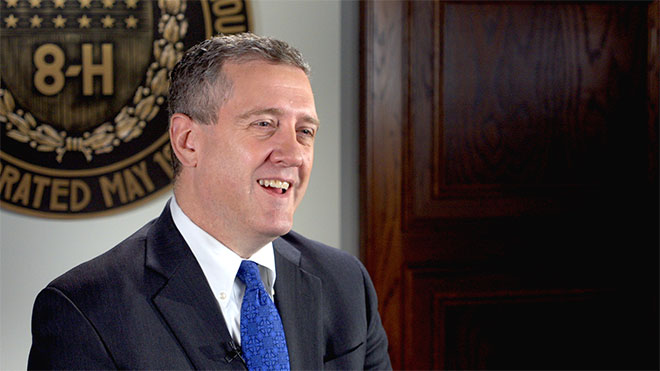James Bullard: A Policymaker’s Reflections on Crisis to Recovery
This 26-minute podcast was released April 13, 2018.
James Bullard became president and CEO of the St. Louis Fed 10 years ago on April 1, 2008. In a series of conversations with his chief of staff, Cletus Coughlin, Bullard reflected on his role as a policymaker, an academic and a CEO during his first decade in office. What’s most fascinating about his journey is that his appointment coincided with the worst financial crisis and recession since the Great Depression.
“The timing of my coming into this role was just shortly after Bear Stearns,” he said. “Most of what I knew about ordinary central banking was going out the window just as I moved on to the FOMC.”
In this podcast, hear Bullard discuss how lowering the federal funds rate target to near zero and trying to decide what to do to further stimulate the economy has been the “challenge of our times.”

Listen to his views on how the Fed avoided a deflationary environment that Japan had experienced, whether unconventional monetary policy known as quantitative easing was successful, and the importance of data-dependent policy even when using unconventional tools.
Follow along to understand how his thinking about how the macroeconomy works evolved into a new narrative, one based on the idea that the economy could have a set of multiple long-run outcomes. Also hear him discuss the “mystery” of why inflation has mostly been below the Fed’s 2 percent target since 2012.
In addition, listen as Bullard advocates for a different approach to normalization (a last-in, first-out approach) than the FOMC ultimately followed, and hear his ideas for what more the Fed could do to increase transparency and communications with the public.
Lastly, Bullard recounts his experience serving as a Reserve bank president and how the financial crisis and Great Recession further brought out the regional Reserve banks’ role as the voices of Main Street.
The St. Louis Fed’s 2017 annual report discussed these topics and others—including the limits of fiscal policy in providing day-to-day stabilization policy, the story of how the Fed adopted an explicit inflation target in 2012 and what Bullard views as a possible wave of the future in central banking.

